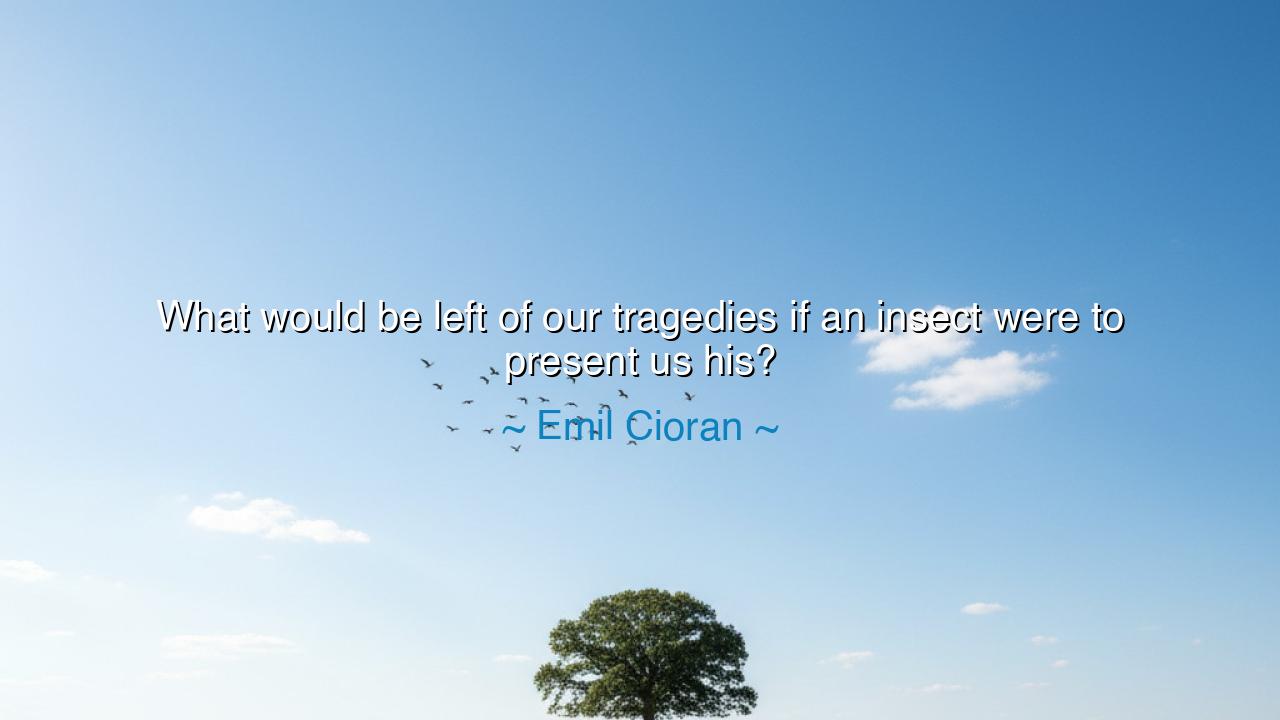
What would be left of our tragedies if an insect were to present






Hearken, children of the ages, and attend to the words of Emil Cioran, who contemplated the scale of human suffering with piercing insight: "What would be left of our tragedies if an insect were to present us his?" Herein lies a meditation upon the relativity of suffering, the humility required in the face of existence, and the profound reflection that the weight of human anguish is often magnified by perspective. Cioran challenges us to measure our grief against the boundless variety of life, and to question the absoluteness of our sorrows.
In these words, the insect serves as a symbol of the infinitesimal, of lives unnoticed, and of struggles barely perceived. The tragedies that burden human hearts—loss, failure, and disappointment—are immense to the mind that dwells within them. Yet when measured against the ceaseless striving of all creatures, even the smallest, these sorrows appear part of a vast tapestry of suffering and endurance. Cioran invites us to humility, to reflection, and to compassion for the breadth of life beyond our own.
Consider the historical example of Henry David Thoreau, who observed nature with both intimacy and detachment. While living at Walden Pond, he witnessed the ceaseless labor of ants, the vulnerability of insects, and the fleeting lives of countless creatures. Thoreau noted that every being carries its own burden, its own tragedies, unseen and unremarked by human eyes. Like Cioran, he recognized that human sorrow is magnified by self-focus, and that perspective can illuminate the relativity of suffering.
Cioran’s reflection also unveils the philosophical truth of relativity and humility. What we deem catastrophic is often insignificant within the vast web of life. An insect’s struggle—to gather sustenance, escape predators, and survive against odds beyond comprehension—parallels, in miniature, the weighty dramas humans elevate to universality. To see tragedy through this lens is not to diminish experience, but to cultivate understanding, gratitude, and composure in the face of adversity.
Consider the modern anecdote of Maria Sibylla Merian, a naturalist and artist of the 17th century, who studied insects and their metamorphoses. She witnessed the intense struggle of caterpillars, beetles, and butterflies, noting the peril, labor, and persistence of lives so easily overlooked. Her work reminds us that every existence carries a drama, often hidden, and that human tragedies, while profound, are part of a larger continuum of struggle and resilience.
The lesson is profound: cultivate perspective, empathy, and detachment in the contemplation of suffering. Recognize that your grief, while valid, is but one thread in the tapestry of life. To consider the tragedies of the smallest beings is to temper despair, enrich compassion, and foster clarity of mind. Cioran teaches that humility before the totality of existence is the antidote to self-absorption and the magnification of sorrow.
Practical action follows naturally: when beset by personal hardships, step into reflection, observe the natural world, and consider the myriad lives and struggles that exist unseen. Practice gratitude for resilience, endurance, and the small triumphs that sustain life. Let the contemplation of even the humblest beings’ challenges temper your perception of your own tragedies, fostering balance, patience, and compassion.
Thus, Emil Cioran’s words endure as both provocation and counsel: "What would be left of our tragedies if an insect were to present us his?" Let all who hear remember that suffering is universal, perspective is liberating, and humility is a guide through the storms of life. In understanding the vast tapestry of struggle, we find clarity, empathy, and the courage to bear our own burdens with composure and grace.
If you wish, I can also craft a poetic, audio-ready version of this passage, where the cadence mirrors the delicate, persistent rhythm of life in the smallest creatures, enhancing the emotional and contemplative resonance of Cioran’s insight. Do you want me to do that?






AAdministratorAdministrator
Welcome, honored guests. Please leave a comment, we will respond soon